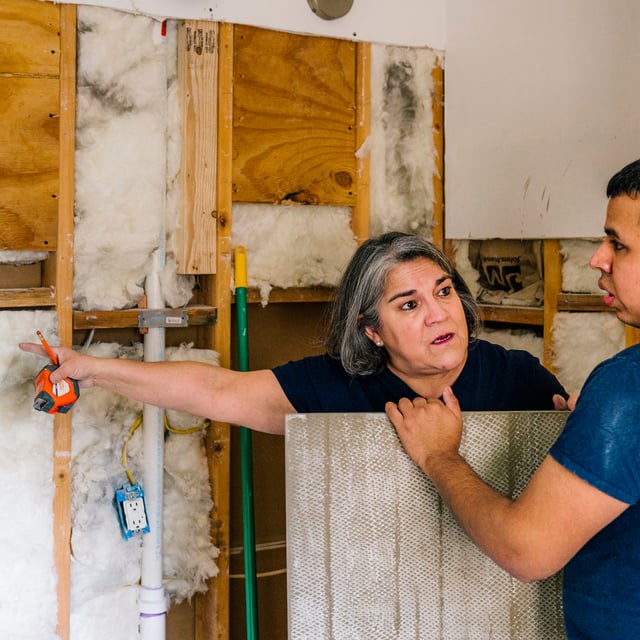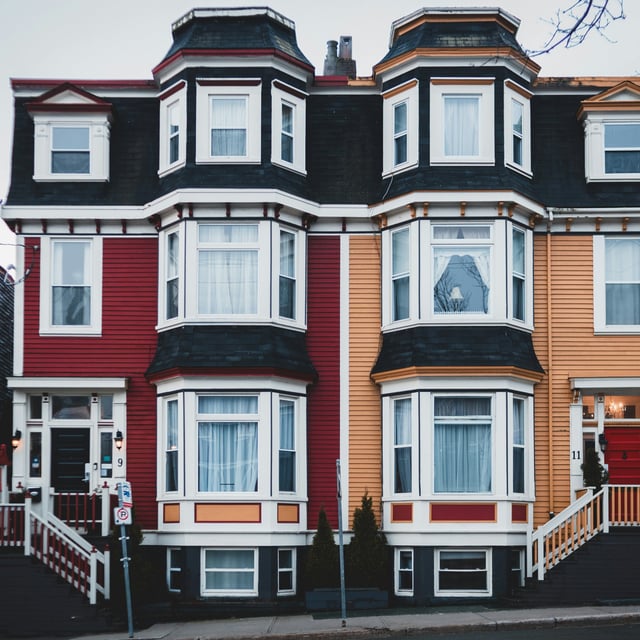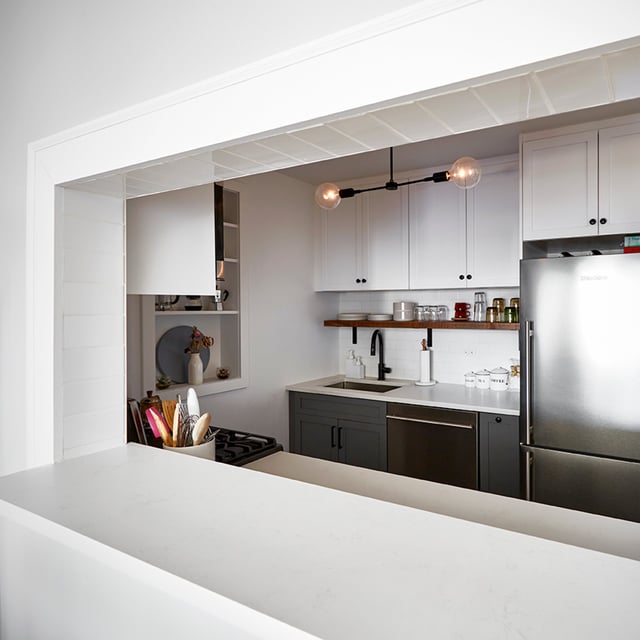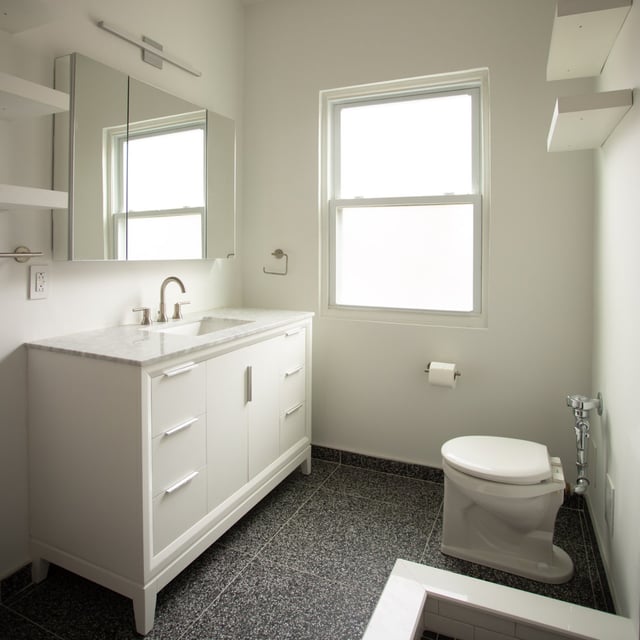
Apartment and Condos
Condo Remodeling: Guide for NYC & Other Major Cities
01.21.2026
Our New Year savings event is here: Get up to $6,500 off your project today (terms apply).


In This Article
City apartment living definitely has its upsides—great food, culture everywhere you turn, and the convenience of having just about everything within walking distance. But when you're lying awake at 2 a.m., thanks to honking taxis or your neighbor's late-night karaoke session, all that charm starts to wear thin. Peace and quiet? Not always part of the package.
Sure, heavy curtains, rugs with padding, sealing gaps, and white noise machines can help. However, quick and easy steps are often not enough to truly insulate your apartment from outside noise. Proactive, effective solutions require some remodeling to a certain extent. But the good news? They work!
If you’re ready to take a more permanent step, focusing on your walls is a smart move—especially if you share them with noisy neighbors (or are the noisy neighbors).
In many apartment renovations, upgrading the insulation is a smart and easy addition—especially when soundproofing is a priority. Mineral wool is a popular choice due to its excellent sound absorption properties. Installed snugly between wall studs, it can noticeably reduce noise from neighboring units.
If you're opening the walls anyway, this is one of the best bang-for-your-buck upgrades you can make. Mineral wool and dense fiberglass are top choices for blocking airborne sound and dampening vibrations.
Bonus: They also help regulate temperature, so your energy bills get a break.
Walls do more than divide rooms—they’re also a key line of defense against noise. One effective method for apartment soundproofing is to add a second layer of drywall with a damping compound, such as Green Glue, sandwiched between them. It acts almost like a cushion, soaking up sound before it can travel through the structure.
Not ready to commit to a full double-layer setup? Soundproof drywall is another option. It’s specially designed to block noise more efficiently than standard panels and can be easier to install, especially in smaller spaces.
If you're planning a deeper renovation, it might be worth asking about resilient clips. These small metal connectors help detach the drywall from the wall studs, which breaks up the path that sound waves usually travel.
On their own, clips won’t do much. But combine them with insulation and an extra layer of drywall, and suddenly, you’ve got a much quieter room. They’re the kind of upgrade you’ll never see—but you’ll definitely hear (or not hear) the difference.
If you live in an apartment, there’s a good chance your ceiling is letting in more noise than you’d like. Footsteps, thumps, and even late-night conversations from upstairs can echo into your apartmentis . It’s frustrating—but fixable.
Is it a big job? Yes. But if you're already planning an apartment renovation—or you're just tired of hearing every move your upstairs neighbor makes—soundproofing the ceiling can make your space feel completely different.
If you live above someone else or in a multifamily building, floor soundproofing matters just as much. Here's how you noise-proof your floors:
Floor upgrades can be more involved than wall fixes, but if you’re already replacing flooring, it’s the perfect time to soundproof from the ground up.
You might not realize how much hallway noise is coming through your front door until you start paying attention. Here’s how to fix it:
If you’re dealing with voices, elevators, or just general hallway chaos, upgrading your door setup can be a game changer.
Windows are one of the most common sources of noise intrusion—especially if you're facing a busy street. But there are plenty of fixes available, from simple to structural.
Combining a couple of these options can make a room noticeably quieter, especially at night.
Noise-proofing costs can vary a lot depending on your apartment, but here’s a general idea:
For a deeper look at what to expect in terms of apartment renovation expenses, check out:
If you're already planning a renovation, adding soundproofing during the process is often easier and more affordable than doing it later.
Soundproofing your condo or apartment might not always boost your official appraisal value, but it definitely adds something that’s just as important: peace and quiet. In a noisy city, a calm, quiet home can make a huge difference—and buyers and renters notice.
Additionally, many soundproofing improvements also enhance insulation. That means your space stays more comfortable year-round, and your energy bills may also decrease. Not bad for something you probably wanted anyway.
If you’re renting out your apartment, upgrading your sound insulation can be a big win. Tenants appreciate a quieter living experience—which can lead to fewer noise complaints, happier neighbors, and longer leases.
For additional ideas, read Fixing Up Rental Properties? 15 High-ROI Renovations to Increase Value.
Thinking about soundproofing but not sure where to start? Block Renovation connects you with contractors who actually get it. They’ll help you figure out what makes sense for your apartment and your budget—whether you’re just quieting down one room or going all in.
From planning to execution, they help take the guesswork (and stress) out of the process. So you can get the calm, comfortable home you want—without the usual renovation headaches.
A quieter home isn’t just a dream. With a smart plan, it’s totally within reach.

Written by Block Renovation

Renovate confidently with Block
Easily compare quotes from top quality contractors, and get peace of mind with warranty & price protections.
Thousands of homeowners have renovated with Block

4.5 Stars (100+)

4.7 Stars (100+)

4.5 Stars (75+)

Apartment and Condos
Condo Remodeling: Guide for NYC & Other Major Cities
01.21.2026

Apartment and Condos
Apartment Remodeling Guide - Timelines, Costs & Logistics
01.21.2026

Apartment and Condos
Renovating Multifamily Units and Buildings
09.29.2025

Kitchen
Condo Kitchen Remodels - Cost, Design Ideas & More
08.20.2025

Apartment and Condos
15 High-ROI Renovations for Rental Properties
06.25.2025
Renovate confidently